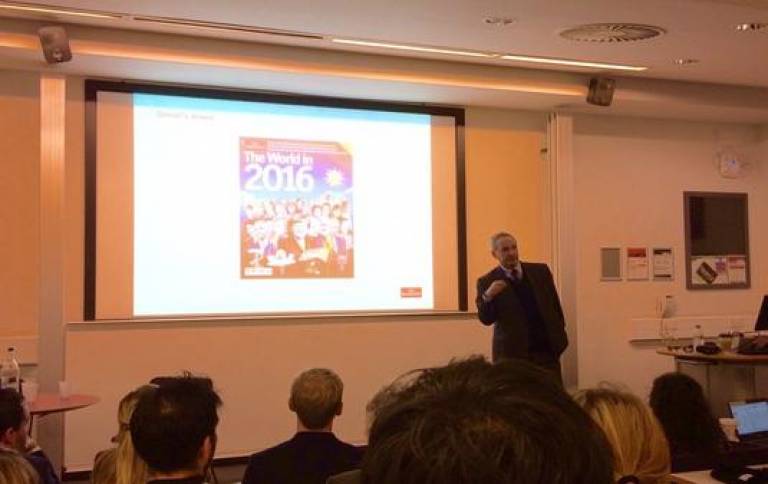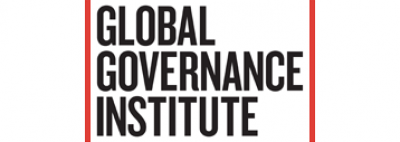The World in 2016
25 February 2016
Matthias Mueller (MSc Global Governance and Ethics) on a GGI keynote lecture with Daniel Franklin, Executive Editor of The Economist.

Give Daniel Franklin, Executive Editor of The Economist, 90 minutes and you get a whistle-stop tour from Mystic Medusa to autonoms (new-speak for driverless cars), from the next Picketty (Hélène Rey) to Aung San Suu Kyi, and from nine-dashed-lines (in the South China Sea) to Syria.
What kind of year will 2016 be? A tumultuous year, dominated by geopolitical crises, oil price movements (or lack thereof), the new normal in China, formidable challenges facing Europe, accelerating advances in technology and, finally, a very difficult to predict US Presidential election. A busy - some may argue, daunting - 2016 by any standards, and one which may well determine the path of world events for years to come. Daniel picked out his favourites from The Economist's 'The World in 2016' publication, describing the year in a countdown from 12. I pick out just a few of them below. Watch the video in full to fill in the gaps!
Female power
Women will be at the centre of many of the big decisions in the world this year and Daniel singled out 12 in particular. Angela Merkel remains the indispensable European and go-to person in 2016 without whose endorsement little happens on the European political front - and there is plenty to grapple with here; more on that later. Three ladies may well come to determine global political and economic events from Washington D.C. - Clinton by winning the election, Yellen by continuing the rise of interest rates and Lagarde by being re-appointed at the IMF, which will once again take economic centre stage as more and more countries face difficulties due to sharp oil price movements (Venezuela potentially being the first to bear the brunt at the moment). The economic developments this year may well catapult Hélène Rey of the London Business School to superstar economist status - or in Daniel's words "the next Picketty" - as her chronicles of financial cycles come into high demand when US interest rate rises trigger reverse cash flows away from developing countries. The women to watch in Asia include the new Taiwanese President ("poking her finger in China's eye"), Grace Poe who has a good chance of winning the elections in the Philippines, Aung San Suu Kyi for heralding in a new era in Burma and finally Malala Yousafzai for continuing her courageous campaign for girls' rights. In Europe two nationalists with a very different political outlook will grab headlines: Nicola Sturgeon and Marine Le Pen.
Economics
The 2016 growth picture will be marked by its lack of standout growth over 10% due to low commodity prices and the notable absence of China in the list of economic top performers. India is now the only top-performing big economy, as it is expected to grow faster than China for the foreseeable future. Interestingly, the growth contribution gap between developed and developing countries is at its largest for a long time, as developing countries' growth has slowed markedly and some have even entered recession, most notably Brazil and Russia. And whilst the global economic outlook is not particularly rosy, some argue that the world is already at the late end of the economic cycle and consequently at risk of entering the next crisis with exceptionally low interest rates and hence little ammunition to fight a renewed downturn.
China
Whether the world actually enters a renewed downturn will to a large extent rest on the growth engine of the last decade. Along with US interest rates, Chinese growth is the key figure to watch as the country enters the "new normal" of around 6% of GDP. Not only is Chinese growth slowing, but its make-up is also changing from investment heavy industries to much more service and consumer-driven growth - a key example is the growth in Chinese business travel, which increases by around 10% every half year. More broadly this shift has significant repercussions around the world as we have already witnessed in the market turmoil of the beginning of the year. This turmoil has also triggered questions over the Chinese economic leadership and the extent to which the government can actually control China's growth rate. Daniel cautioned that as we watch that growth figure, it is crucial to remember that 6% growth is still very impressive. Meanwhile China's cityscape continues to change at a rapid pace, but the 10 fastest growing cities are now located inland. In accordance with its economic might, China is also increasingly throwing its geopolitical weight around. China's claim to territory within the nine-dash line in the South China Sea will lead to growing tensions with the US and Daniel argued that China is currently pushing its luck more than it usually would because it sees the Obama administration as reluctant to engage in a stand-off.
Europe
Europe is Daniel's 4 with the four existential concerns the continent faces in 2016. The Euro crisis has abated as low commodity prices, the weak Euro and ECB quantitative easing are all stimulating the European economy and particularly helping exporters. Government spending on the refugee crisis, especially in Germany, is acting as an additional stimulus. Altogether this should allow the Euro area to get through 2016 unscathed, notwithstanding remaining politico-economic risks (for example in Greece). The refugee crisis could also have a significant negative impact as the increasing number of migrants could politically destabilise the EU. More broadly, the refugee crisis is threatening the very foundations of the EU and as EU summits come and go without a meaningful European solution to the problem, European solidarity is called into question. The third concern is geopolitical and personified by just one man - Vladimir Putin. Daniel highlighted that Russian elections are approaching (in March 2018) and could encourage Putin to make (another) bold geopolitical stand with fear riding particularly high in the Baltics. Finally, the referendum on Britain's membership of the EU on the 23rd of June poses a huge question not just for the UK, but also for the future of the European project - on top of representing an extremely unwelcome distraction in amongst all the other challenges the EU is currently facing. Whilst Daniel believes Britons will vote to stay in, if Brexit were to happen, Europe would lose an important force that is greatly valued across the EU for its openness and liberalism, thus upsetting the current balance of forces around Brussels' negotiating tables. Most importantly, Brexit would undermine the reputation of the EU and entail a significant loss of global esteem.
The Economist and its predictions
Daniel happily admitted that The Economist gets its predictions quite right and quite wrong frequently and shared his thoughts on the worst and the best of the 'Year In' publication. The Economist failed to foresee the financial crisis in 2008 and headlined its 2009 issue with a big "sorry". On the positive side, in 2001, the publication predicted that Afghanistan would be the least stable country in the world and experience significant tumult. The least we can say is that the great gift for such a well-versed journalist- and the publication that he leads - is that he can really stick his neck out and make bold predictions across a vast array of fascinating topics. And in that he certainly succeeded.
Only time will tell whether Daniel will join the pantheon of eminent "super-forecasters" he mentioned, but here are a few highlights of his predictions:
- Clinton will be US President at the end of the year after a very close fight against Rubio.
- Britain will vote to stay in the EU.
- There will be another major terrorist attack in the West - the question is where, not if.
- LDL (Let's Discuss Live), millenialisation and autonom will be amongst the words of the year 2016.
 Close
Close


